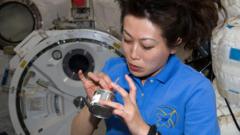The ESA’s innovative approach addresses the high expenses—up to £20,000 daily per astronaut—of supplying food during missions. The initiative is led by Dr. Aqeel Shamsul from Frontier Space, who envisions factories producing food in orbit and on the Moon. Current lab-grown advancements on Earth include chicken and steak, with additional benefits such as decreased environmental impact in traditional farming.
The experiment involves a bioreactor that cultivates essential food components like proteins, fats, and carbohydrates by using genetically modified yeasts to create a mixture sent into space aboard SpaceX's Falcon 9. Researchers will evaluate its performance in orbit over three hours, returning it to Earth for analysis. A taste test conducted by Imperial College’s culinary designer, Jakub Radzikowski, demonstrated promising gastronomic potential despite the less-than-appetizing appearance of the food product.
Helen Sharman, the UK's first astronaut, provided tasting feedback, highlighting the potential for lab-grown options to enhance both flavor variety and nutritional quality, essential for astronauts' health during extended missions. As the project progresses, the team anticipates developing more complex foods, paving the way for a sustainable food source in space.
The experiment involves a bioreactor that cultivates essential food components like proteins, fats, and carbohydrates by using genetically modified yeasts to create a mixture sent into space aboard SpaceX's Falcon 9. Researchers will evaluate its performance in orbit over three hours, returning it to Earth for analysis. A taste test conducted by Imperial College’s culinary designer, Jakub Radzikowski, demonstrated promising gastronomic potential despite the less-than-appetizing appearance of the food product.
Helen Sharman, the UK's first astronaut, provided tasting feedback, highlighting the potential for lab-grown options to enhance both flavor variety and nutritional quality, essential for astronauts' health during extended missions. As the project progresses, the team anticipates developing more complex foods, paving the way for a sustainable food source in space.


















